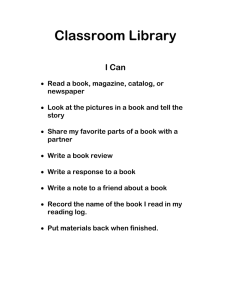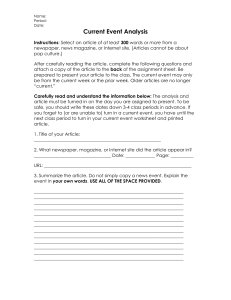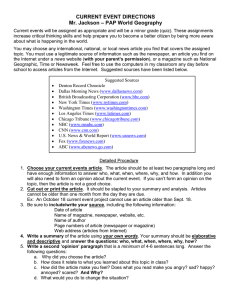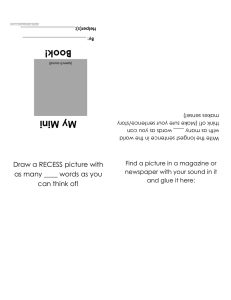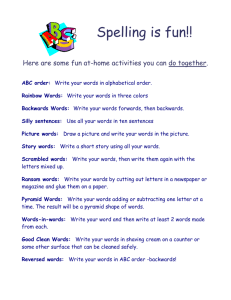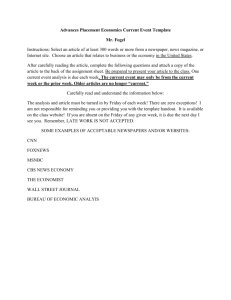Course: MAC 405 Advanced Newspaper and Magazine Production (3 credits. Compulsory) Course Duration: session
advertisement
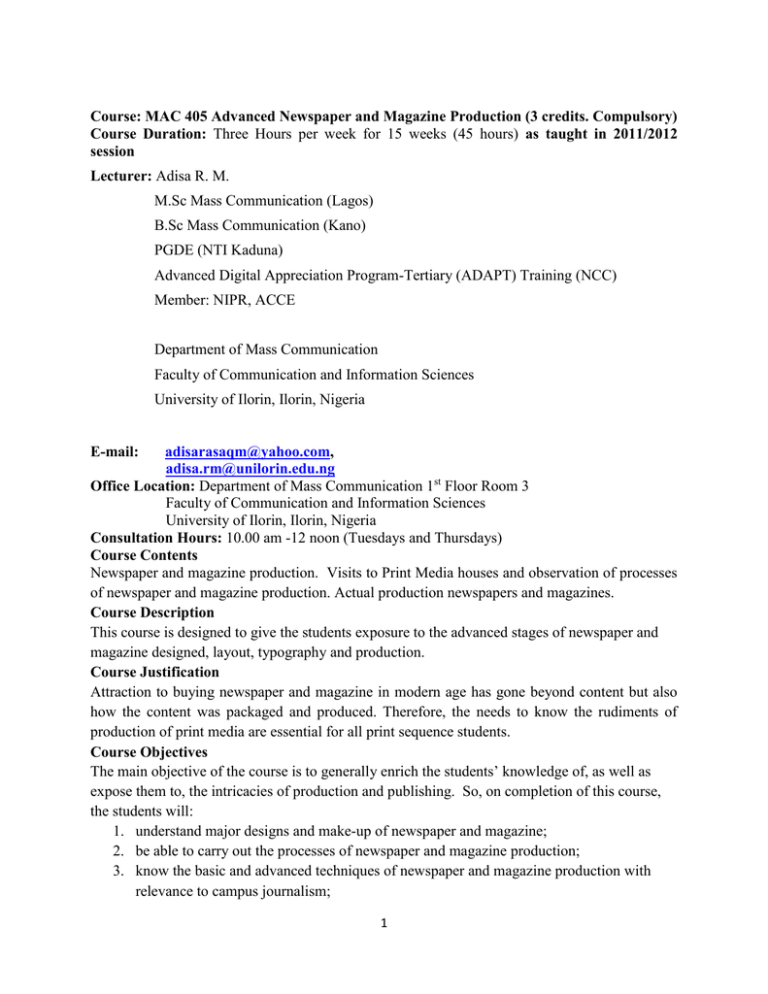
Course: MAC 405 Advanced Newspaper and Magazine Production (3 credits. Compulsory) Course Duration: Three Hours per week for 15 weeks (45 hours) as taught in 2011/2012 session Lecturer: Adisa R. M. M.Sc Mass Communication (Lagos) B.Sc Mass Communication (Kano) PGDE (NTI Kaduna) Advanced Digital Appreciation Program-Tertiary (ADAPT) Training (NCC) Member: NIPR, ACCE Department of Mass Communication Faculty of Communication and Information Sciences University of Ilorin, Ilorin, Nigeria E-mail: adisarasaqm@yahoo.com, adisa.rm@unilorin.edu.ng Office Location: Department of Mass Communication 1st Floor Room 3 Faculty of Communication and Information Sciences University of Ilorin, Ilorin, Nigeria Consultation Hours: 10.00 am -12 noon (Tuesdays and Thursdays) Course Contents Newspaper and magazine production. Visits to Print Media houses and observation of processes of newspaper and magazine production. Actual production newspapers and magazines. Course Description This course is designed to give the students exposure to the advanced stages of newspaper and magazine designed, layout, typography and production. Course Justification Attraction to buying newspaper and magazine in modern age has gone beyond content but also how the content was packaged and produced. Therefore, the needs to know the rudiments of production of print media are essential for all print sequence students. Course Objectives The main objective of the course is to generally enrich the students’ knowledge of, as well as expose them to, the intricacies of production and publishing. So, on completion of this course, the students will: 1. understand major designs and make-up of newspaper and magazine; 2. be able to carry out the processes of newspaper and magazine production; 3. know the basic and advanced techniques of newspaper and magazine production with relevance to campus journalism; 1 4. be able to appreciate the importance of the positions of special pages in print media; 5. understand the importance of magazine cover; and 6. know how to produce newspaper and magazine. Course Requirements The course is required for all students at 400 level in the Department of mass communication. Students should also have at least 75% class attendance before such students could be eligible to write the semester examination. Students are also required to participate fully in the practical sessions as directed by the course lecturer. Assignments must be submitted as at when due and study questions be treated appropriately. Methods of Grading S/N Types of Grading 1. Test 2. Assignment/Project/Production 3. Participation in online discussion forum 4. Final Examination Total Score (%) 10 25 5 60 100 Course Delivery Strategies The main method of course delivery is face-to-face lectures, practical, visit to print media organizations in Ilorin, discussions, small group exercises and joining and participating in online group discussion. Lecture Content Week 1-2: Organization of a newspaper and magazine outfit Objective The main objectives of the weeks are to distinguish between newspaper and magazine outfits. Also, Students will be equipped with the knowledge of the functions and duties of various personnel in these organizations. Description First Hour week 1 Departments in a newspaper outfit Departments in a magazine outfit Second and Third Hours week 1 Organizational structure of a newspaper outfit Organizational structure of a magazine outfit First and second Hours week 2 Functions and duties of the personnel in both newspaper and magazine outfits. Third Hour week 2 Structure of media ownership Types of media ownership 2 Study Questions: 1. List the major departments in a newspaper organization. 2. Explain the functions of newspaper editorial department. 3. What are the duties of advertising department? 4. In the modern age of online journalism, will say circulation department is still relevant? 5. How does organizational structure predict pattern of authority and responsibility in print media? 6. Describe the pattern of newspaper and magazine ownership in Nigeria. Reading List 1. Anaeto S. G., Anaeto M. S. and Tejumiaye J. A. (2009). Ibadan: Stirling-Horden Publishers, pp. 52-61. ISBN: 978-032-589-1. 2. Adisa4 R. M. (2005) Fundamentals of Newspaper and Magazine Editing and Production. Osogbo: Positive Impact Publications, p. 23. ISBN: 978-32581-4-3. Week 3: Techniques of Newspaper and Magazine production preparation Objective The main objectives of this week are to explain to students the general steps involved in producing newspaper and magazine. Description First Hour News and information gathering News and feature writing Second Hour Editing Typesetting and composition Third Hour Design Lithography Printing and packaging Study Questions 1. List the newsgathering methods. 2. Where can news and information be gathered for newspaper and magazine? 3. What are the basic principles governing the use of news and information in print media? 4. Explain the methods of typesetting for newspaper and magazine. 5. Describe briefly printing and packaging of print media. Reading List 1. Anaeto4 S. G., Anaeto M. S. and Tejumiaye J. A. (2009). Ibadan: Stirling-Horden Publishers, pp. 88-113. ISBN: 978-032-589-1. 2. Adisa4 R. M. (2005) Fundamentals of Newspaper and Magazine Editing and Production. Osogbo: Positive Impact Publications, pp. 33-34. ISBN: 978-32581-4-3. Week 4: Print Production Tools Objective The objectives of this week are to explain the tools and instruments that editor and production editors use in their day to day activities. 3 Description First Hour Dummy sheet Printer’s ruler Exercise on the use of dummy sheet and printer’s ruler Second and third Hours Traditional editing symbol Application of editing symbols Study Questions 1. Describe dummy sheet. 2. Describe how printer’s ruler is used. 3. List the traditional editing symbols. 4. Apply the traditional editing symbols to the editing of a story. 5. How important are the traditional editing symbols in the age of desktop publishing? Reading List 1. Adisa4 R. M. (2005) Fundamentals of Newspaper and Magazine Editing and Production. Osogbo: Positive Impact Publications, pp. 38-43. ISBN: 978-32581-4-3. Week 5: Print Media Production Framework Objective The main objectives of this week are to explain to students the major newspaper and magazine production frame work. Description First Hour Newspaper formats Second Hour Basic characteristics of tabloid Basic characteristics of broadsheet Third Hour Vertical and horizontal make-up Advantages and disadvantages of vertical make-up Advantages and disadvantages of horizontal make-up Study Questions 1. Explain the two major newspaper formats. 2. List newspapers in Nigeria that have tabloid and broadsheet formats. 3. Describe, with graphical examples, vertical make-up of newspaper. 4. Distinguish between tabloid and broadsheet newspaper. 5. What are the advantages of vertical and horizontal make-up on newspaper look? Reading List Adisa4 R. M. (2005) Fundamentals of Newspaper and Magazine Editing and Production. Osogbo: Positive Impact Publications, pp. 107-111. ISBN: 978-32581-4-3. Week 6: Newspaper structure Objective 4 The objectives of this week are to explain to students the various parts and structure of newspaper. Description First Hour Importance of the front page, back page and inside pages. Elements in the front, back, and inside pages of a standard newspaper. Second and Third Hours Analysis of the major parts of a newspaper Study Questions 1. Describe the front and back pages of two standard newspapers publish in Nigeria. 2. List the major parts of newspaper. 3. State the importance of each of the pages. 4. Compare the back and inside pages of newspaper. 5. State the elements in each of the pages of newspaper. Reading List Adisa4 R. M. (2005) Fundamentals of Newspaper and Magazine Editing and Production. Osogbo: Positive Impact Poblications, pp 103-104. ISBN: 978-32581-4-3. Week 7: Graphics of Magazine Objective The objectives of the week are to describe and point out the major structure of magazine as well as the factors determining the patterns. Description First Hour Optimum structure regarding editorial and advertisements ratio. Factors determining structural patterns such as page size, printing and binding. Second Hour Types of magazine structure such as: all editorial content, all advertising content. Preferences for each structure Third Hour Process of designing a magazine Paper quality Paper size The grid Type Study Questions 1. Select a national newspaper and magazine then make a comparism of the news and advertising ratio. 2. What are the factors determining structural patterns such as page size, printing and binding? 5 3. Describe the structure determining structural patterns such as page size, printing and binding. 4. Discuss the types of magazine structure such as: all editorial content, all advertising content. 5. Discuss the process of designing magazine. Reading List 1. McKay4 J. (2001) The Magazines Handbook. London: Routledge. pp.158- 169. ISBN 0203-13132-0 Week 8: Magazine Cover Objective The main objective of this week topic is to introduce students to the rudiments of magazine cover and also its importance as the most vital element in creating a total image for the magazine. Description First Hour Elements of a cover format: magazine title, logo design Illustration and colour combination Second Hour Guidelines for making magazine cover Basic objectives of a cover Third Hour Identification of cover subjects Designing cover using various elements Study Questions 1. Analyze the various elements of a cover format. 2. Explain the general guidelines for making good magazine cover. 3. Identify cover subjects which are most likely to attract the readers’ immediate attention. 4. Select two magazines published in Nigeria and make a comparism of the two. 5. What are the steps required in selecting magazine cover subjects? Reading List 1. Adisa4 R. M. (2005) Fundamentals of Newspaper and Magazine Editing and Production. Osogbo: Positive Impact Publications, pp 103-104. ISBN: 978-32581-4-3. 2. McKay4 J. (2001) The Magazines Handbook. London: Routledge.pp.158- 169. ISBN 0203-13132-0 Week 9: Problems in newspaper and magazine production/Test (CA) Objective The main objectives of this week are to appreciate the problems in newspaper and magazine publishing. Also, at end of the first and second hours of lecture, students will be examined to find out their understanding of all the topics we have discussed from weeks 1to 8. Description First Hour 6 Problems of funding, low readership, circulation, management, socio-political and economic. Second Hour Solutions to the problems Solutions proposal from students Third Hour Test Study Questions 1. Identify the various problems of printing. 2. Describe the problems of management and funding. 3. What are the possible solutions to the problems? 4. What are the major causes of low readership in Nigeria? 5. What is circulation? Reading List: 1. Adisa4 R. M. (2005) Fundamentals of Newspaper and Magazine Editing and Production. Osogbo: Positive Impact Publications, pp 181-182. ISBN: 978-32581-4-3. Week 10: Printing Technology of Newspaper and Magazine Objective Students will be acquainted with the knowledge of the various types of printing technology which are used for industrial process of reproducing copies of texts and images. Description First Hour History of printing Art of printing Second Hour Functions of printing Methods of printing Third Hour Kinds of printing Machines Study Questions 1. Trace the history of printing from Johann Gutenberg invention in 1440 to modern time. 2. Describe printing as the mechanical reproduction of texts and images. 3. What are the functions and dysfunctions of printing? 4. List methods of printing. 5. How are letterpress and offset printing carried out? Reading List: 1. Adisa4 R. M. (2005) Fundamentals of Newspaper and Magazine Editing and Production. Osogbo: Positive Impact Publications, pp 120-133. ISBN: 978-32581-4-3. 2. Anaeto4 S. G., Anaeto M. S. and Tejumiaye J. A. (2009). Ibadan: Stirling-Horden Publishers, pp. 110-113. ISBN: 978-032-589-1. 3. Okoye4 I. (2004). Magazinology. Lagos: Mbeyi and Associates, pp. 93-98. Week 11-12: Layout and Designs Objective 7 The objectives of this week are to explain the process of arranging headlines, body type, photos, and other elements on a newspaper and magazine pages. Description First Hour week 11 Meaning of make-up/layout Factors that influence modern make up Second Hour week 11 Principle of good make up Third Hour week 11 General rules of newspaper and magazine make-up First Hour week 12 Types of make-up Make-up and layout process Second Hour week 12 Making-up the front page Third Hour week 12 Back page make-up Inside pages make-up Study Questions 1. What is make-up? 2. State the factors that influence the modern make-up. 3. Describe the basic principles of good make-up. 4. What are the rules that must be observed in page make-up? 5. List the types of make-up. 6. Compare and contrast focus and modular make-up. 7. Which type of make-up will be most ideal for the planning of editorial pages? 8. Evaluate the process of make-up in relation to the low circulation rate. 9. Do a carefully and detailed analysis of the front page of a standard newspaper in Nigeria. 10. What are the regular elements in the back page of the Punch newspaper? 11. Describe the steps in planning the inside pages of national newspaper. Reading List: 1. Adisa4 R. M. (2005) Fundamentals of Newspaper and Magazine Editing and Production. Osogbo: Positive Impact Poblications, pp 103-118. ISBN: 978-32581-4-3. 2. Anaeto S. G., Anaeto M. S. and Tejumiaye J. A. (2009). Ibadan: Stirling-Horden Publishers, pp. 104-108. ISBN: 978-032-589-1. 3. Osho 4 S. A. (2007) Graphic Arts and Designs in Mass Communication. Abeokuta: Essoh Consult Publications, pp 124- 135. ISBN: 978-978-48540-2-6. Week 13-14: Newspaper and Magazine Production (Practical) Objective The main objectives of this weeks are for students to put to use, in practical, all the procedures and processes of newspaper and magazine production that have been discussed from weeks 1-12. Description First, Second and Third Hours of week 13 (production) 8 Grouping of students to editorial and production teams Editing of news stories Identification and marking for selection of newsworthy stories First, Second and Third Hours of week 14 (production) Preparing dummy for newspaper pages Positioning the name plate, folio, motto and emblem, promo. Sketch out all news stories, features, headlines, pictures, advertisements etc in the dummy. Position the back page elements in the dummy Position the inside pages elements in the dummy Begin the art work, filming, plating and printing. Reading List: 1. Adisa4 R. M. (2005) Fundamentals of Newspaper and Magazine Editing and Production. Osogbo: Positive Impact Poblications, pp 103-118. ISBN: 978-32581-4-3. 2. Anaeto S. G., Anaeto M. S. and Tejumiaye J. A. (2009). Ibadan: Stirling-Horden Publishers, pp. 104-108. ISBN: 978-032-589-1. 3. Okoye4 I. (2004). Magazinology. Lagos: Mbeyi and Associates, pp. 93-98. 4. Osho 4 S. A. (2007) Graphic Arts and Designs in Mass Communication. Abeokuta: Essoh Consult Publications, pp 124- 135. ISBN: 978-978-48540-2-6. Week 15: Revision Objective This week which is the last week of lecture and contact in the semester, students will have the opportunity of seeking for clarifications on any area or issue regarding newspaper and magazine production. Also, they will be expected to submit the dummy works they carried out in weeks 13 and 14. Revision Questions 1. Explain the functions of newspaper editorial department. 2. What are the duties of advertising department? 3. In the modern age of online journalism, will say circulation department is still relevant? 4. How does organizational structure predict pattern of authority and responsibility in print media? 5. Explain the methods of typesetting for newspaper and magazine. 6. Describe briefly printing and packaging of print media. 7. Apply the traditional editing symbols to the editing of a story. 8. How important are the traditional editing symbols in the age of desktop publishing? 9. What are the advantages of vertical and horizontal make-up on newspaper look? 10. Compare the back and inside pages of newspaper. 6. Select two magazines published in Nigeria and make a comparism of the two. 11. What are the steps required in selecting magazine cover subjects? 12. What are the major causes of low readership in Nigeria? 13. Trace the history of printing from Johann Gutenberg invention in 1440 to modern time. 14. Do a carefully and detailed analysis of the front page of a standard newspaper in Nigeria. 15. What are the regular elements in the back page of the Punch newspaper? Reading List 9 1. Adisa4 R. M. (2005) Fundamentals of Newspaper and Magazine Editing and Production. Osogbo: Positive Impact Poblications, pp 103-118. ISBN: 978-32581-4-3. 2. Anaeto S. G., Anaeto M. S. and Tejumiaye J. A. (2009). Ibadan: Stirling-Horden Publishers, pp. 104-108. ISBN: 978-032-589-1. 3. Okoye4 I. (2004). Magazinology. Lagos: Mbeyi and Associates, pp. 93-98. 4. Osho 4 S. A. (2007) Graphic Arts and Designs in Mass Communication. Abeokuta: Essoh Consult Publications, pp 124- 135. ISBN: 978-978-48540-2-6. 10
